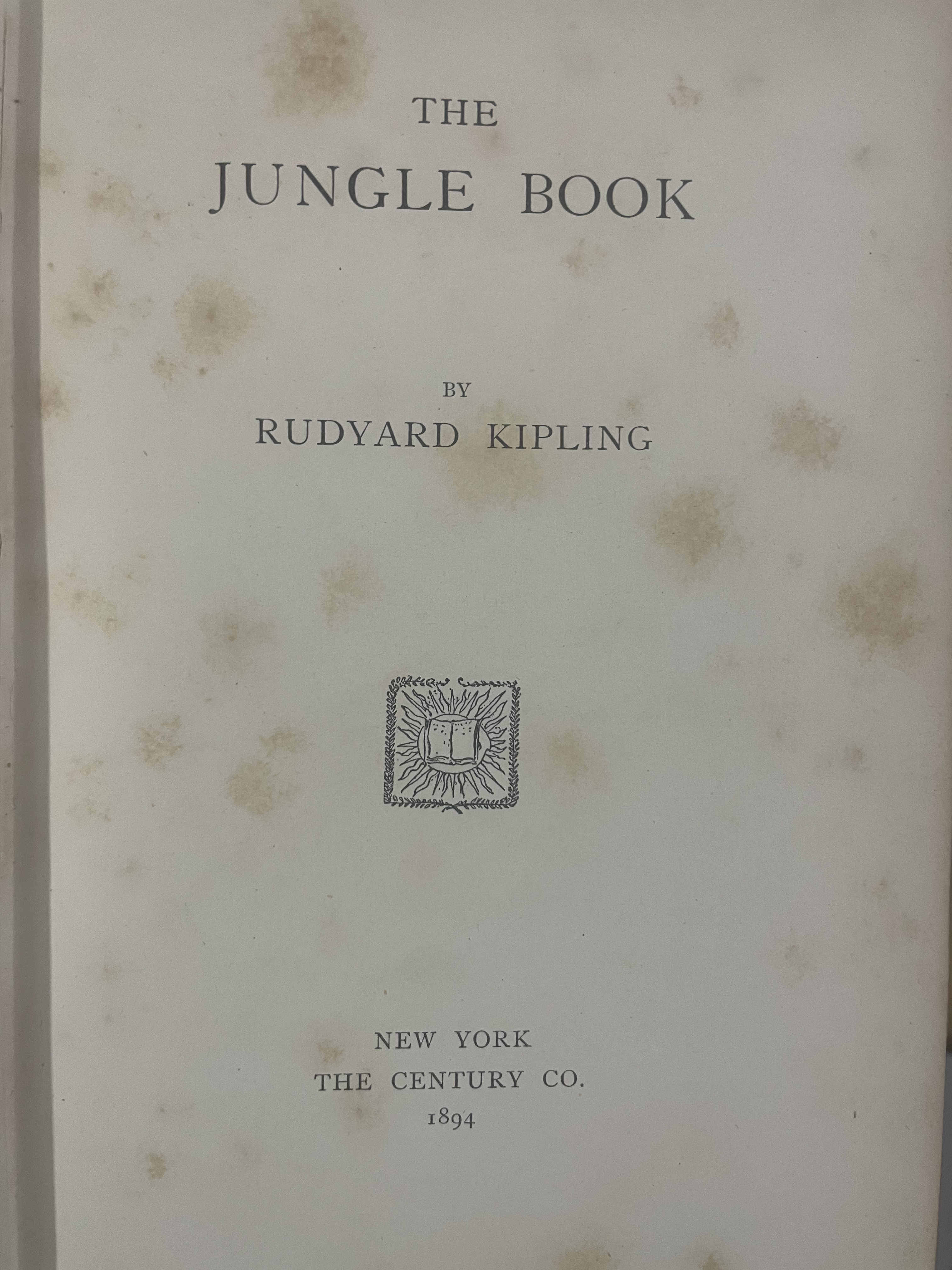The Jungle Book : Original Edition

About
Summary
Exquisite
TOC
Details
Related
URL
Images
Overview
The Jungle Book, an 1894 collection of stories by Rudyard Kipling, is set in a forest in India and features animals with human characteristics. The stories, which include Mowgli's adventures, Rikki-Tikki-Tavi, The White Seal, Toomai of the Elephants, and Her Majesty’s Servants, use animals in an anthropomorphic manner to teach moral lessons.Mowgli's Story:
Early Life: Mowgli is found as an infant by Father and Mother Wolf, who adopt him into their pack. He grows up learning the Law of the Jungle from Baloo the bear and Bagheera the black panther.
Kidnapping: Mowgli is kidnapped by the Bandar-log, a group of monkeys who disregard the Law of the Jungle. Baloo and Bagheera rescue him.
Leaving the Jungle: As Mowgli grows older, some wolves resent him, influenced by Shere Khan, a tiger who believes Mowgli doesn't belong in the jungle. After a confrontation, Mowgli decides to live among humans.
Life in the Village: While living with humans, Mowgli kills Shere Khan. After Mowgli skins Shere Khan, Buldeo, a villager, attempts to steal the pelt, leading the other villagers to accuse Mowgli of sorcery and force him to leave.
Return to the Jungle: Mowgli returns to the jungle but knows his return is temporary, as he will eventually live among humans.
Importance of Book
Moral Lessons: The stories are fables that use animals to teach moral lessons. The Law of the Jungle provides rules for the safety of individuals, families, and communities.
Enduring Popularity: The Jungle Book has remained popular due to its storytelling and various adaptations in film and other media.
Influence on the Scout Movement: The book influenced the scout movement, whose founder, Robert Baden-Powell, was a friend of Kipling.
Key Themes
Abandonment and Fostering: A major theme is abandonment followed by fostering, mirroring Kipling's childhood. This is evident in Mowgli's upbringing by wolves. The triumph of protagonists like Rikki-Tikki-Tavi and The White Seal over their enemies also echoes this theme.
Law and Freedom: The stories emphasize the importance of law, respect for authority, obedience, and understanding one's place in society, as exemplified by the law of the jungle. They also illustrate the freedom to navigate different worlds, such as Mowgli's ability to move between the jungle and the village.
Human Archetypes in Animal Form: The stories are not about animal behavior or the Darwinian struggle for survival but about human archetypes represented through animals.
Wildness and Lawlessness: Critics have noted the presence of wild and lawless energies, reflecting the irresponsible side of human nature.
Cultural Significance
Influence on Storytelling: The Jungle Book has significantly impacted storytelling, particularly in its use of anthropomorphic animals to convey moral and social lessons.
Adaptations and Popular Culture: The book's numerous adaptations into films, television shows, and other media have cemented its place in popular culture. Disney's The Jungle Book is a notable example, bringing the stories to a wider audience.
Controversial Interpretations: Despite its popularity, some critics are wary of Kipling due to his perceived imperialism, while still acknowledging the power of his storytelling. Others have interpreted the work as allegories of the politics and society of the time.
Effects on Society
Moral Education: The book has contributed to the moral education of children through its fables and lessons about responsibility, respect, and community.
Promotion of Indian Wildlife and Culture: The Jungle Book has increased awareness and interest in Indian wildlife and culture, although often viewed through a colonial lens. The stories are set in a forest in India, with Seeonee (Seoni) in Madhya Pradesh being repeatedly mentioned.
Influence on the Scout Movement: Robert Baden-Powell, the founder of the scout movement, was a friend of Kipling, and The Jungle Book has been influential in the movement.
Allegories of Politics and Society: Some readers have interpreted The Jungle Book as allegories of the politics and society of the time. Kipling put in them nearly everything he knew or heard or dreamed about the Indian jungle.
Complex Legacy: Kipling confesses to borrowing ideas and stories in the Jungle Book. He wrote, "I am afraid that all that code in its outlines has been manufactured to meet 'the necessities of the case': though a little of it is bodily taken from (Southern) Esquimaux rules for the division of spoils. In fact, it is extremely possible that I have helped myself promiscuously but at present cannot remember from whose stories I have stolen.
Title
The Jungle Book : Original Edition
Author
Rudyard Kipling
Name of Publisher
The Century Newyork
Publish Date
1914
Subject
Stories about Mowgli,
Vintage
1901-1947
Category
Literary
Sub Category
Fiction
Rarity
RARE
